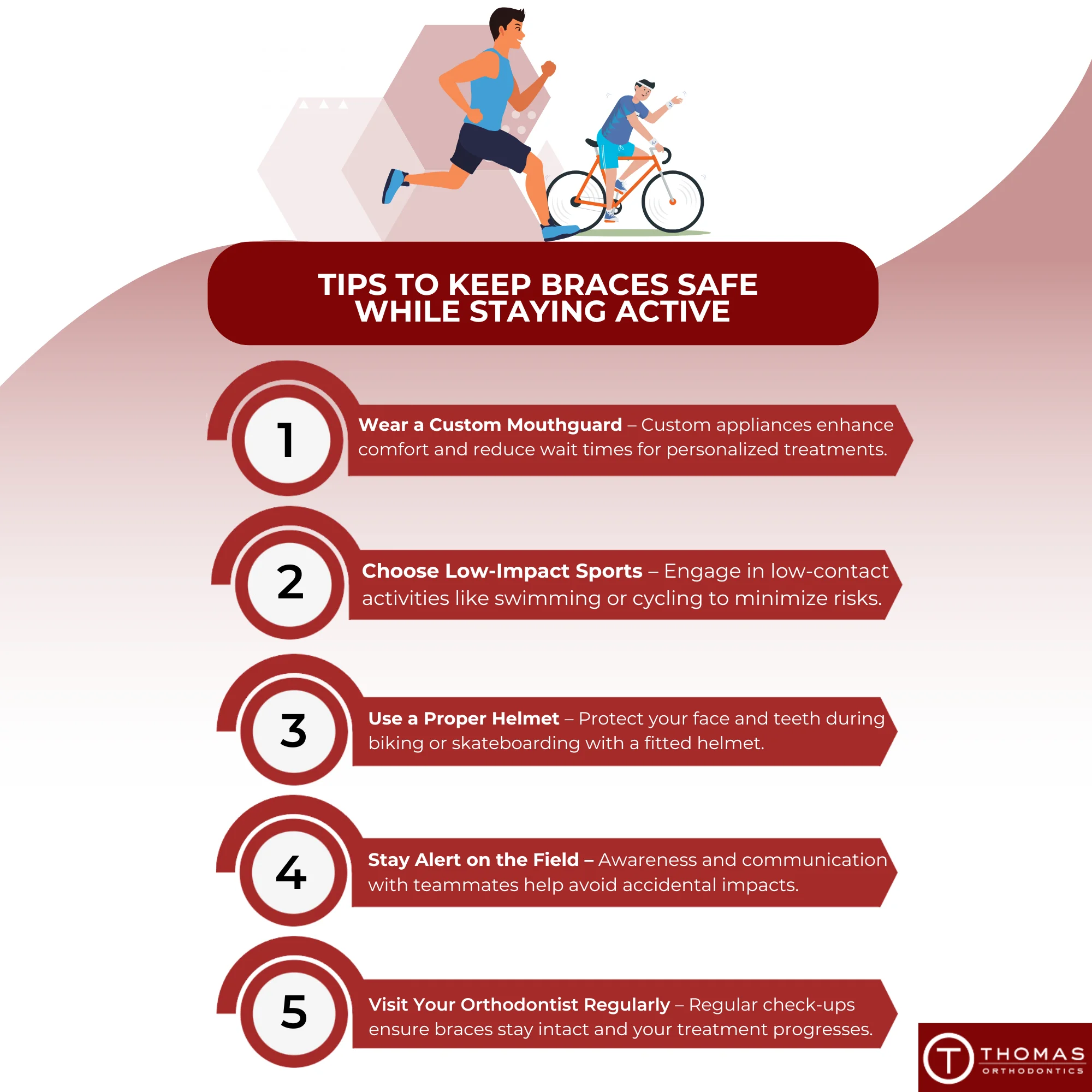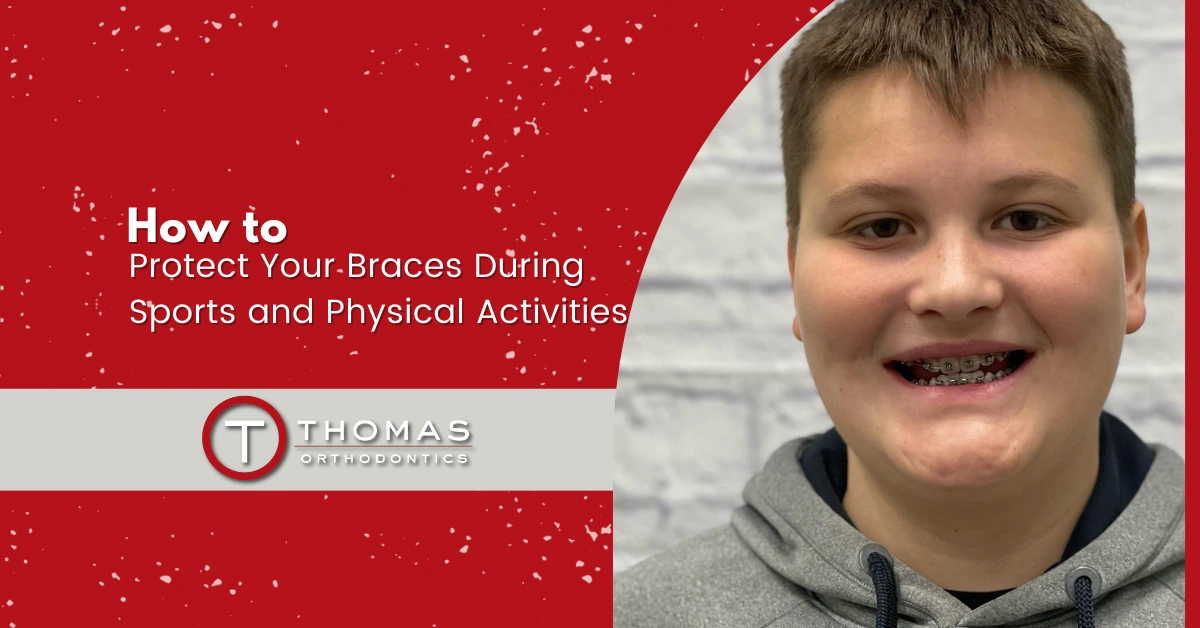To protect your braces during sports and physical activities, always use a mouthguard. Custom-fitted options are best, as they absorb impact and minimize injury risks. Choose low-contact sports like swimming or track and field, and avoid high-contact ones such as football or hockey. If participating in activities with higher risks, wear a properly fitted helmet for added facial protection. Stay informed about your surroundings and communicate with coaches to enhance safety. Regular check-ups with your orthodontist guarantee your braces are in good condition. With these precautions in mind, you can enjoy sports without compromising your orthodontic treatment.

Key Takeaways
- Always wear a custom-fitted mouthguard during contact sports to protect your braces and teeth from injuries.
- Avoid high-contact sports like football and hockey, which pose greater risks to your braces.
- Use a properly fitted helmet with a face guard for activities like biking and skateboarding to cushion impacts.
- Stay aware of your surroundings and communicate with coaches to minimize accidental collisions during practices.
- Schedule regular orthodontic check-ups to monitor progress and address any issues promptly for optimal treatment results.
Use a Mouthguard
When participating in sports while wearing braces, using a mouthguard is essential to protect your teeth and orthodontic appliances. A properly fitted mouth guard helps absorb impact, reducing the risk of injury to your mouth, gums, and braces.
This is particularly important in contact sports like football, basketball, or hockey, where the chances of a collision are higher.
You’ve got a few options when it comes to mouthguards. Stock mouthguards are readily available but may not fit well.
Custom-fitted mouthguards, made by your orthodontist, offer the best protection and comfort. They’re designed to fit perfectly over your braces and teeth, ensuring you can perform at your best while minimizing the risk of damage.
Choose the Right Sport
Choosing the right sport while wearing braces is essential for both your safety and enjoyment.
When you’re active, it’s vital to reflect on how to protect braces in sports. Some sports can be more demanding on your braces than others, so selecting activities that minimize risk is key.
Here are some sports you might contemplate:
- Swimming: Low impact and no risk of collision, making it braces-friendly.
- Track and Field: Individual events typically have less contact, reducing injury risk.
- Cycling: A great way to stay fit while maintaining distance from potential collisions.
- Tennis: Engaging but generally safe, as long as you keep a mindful distance from opponents.
However, you should avoid high-contact sports like football or hockey, where braces can easily get damaged.
Instead, focus on sports that allow you to have fun without putting your orthodontic work at risk. By choosing wisely, you can enjoy your favorite activities while ensuring your braces stay intact and effective.
Always remember that safety comes first, so stay aware and make informed choices!
Wear a Helmet
Protecting your smile during sports is vital, especially when you have braces. One of the most effective ways to safeguard your mouth and teeth is by wearing a helmet. This simple step can greatly reduce the risk of injury during high-impact activities such as biking, skateboarding, or contact sports.
When you wear a helmet, it not only protects your head but also cushions your face, minimizing the chance of damaging your braces. Even minor falls can lead to serious harm, and braces can make your teeth more vulnerable. Helmets designed for sports come with various features, including face guards, which can provide additional protection for your smile.
Make certain your helmet fits properly to guarantee maximum protection. A correctly fitted helmet will stay in place during movement, giving you peace of mind while you enjoy your favorite sports.
Stay Informed
Staying informed about the best practices for protecting your braces during sports is essential for maintaining your orthodontic health.
You might wonder, can you play sports with braces? Absolutely! However, knowledge is key to ensuring your safety and comfort while participating in physical activities.
Here are some tips to keep in mind:
- Choose the right mouthguard: A custom-fitted mouthguard can greatly reduce the risk of injury.
- Be aware of your surroundings: Stay alert during games to avoid accidental collisions that could damage your braces.
- Communicate with your coach: Inform them about your braces so they can help protect you during practice and games.
- Know what to do in case of an emergency: Familiarize yourself with how to address any issues, like broken brackets or wires.
Regular Check-Ups
Regular check-ups are an essential part of your orthodontic journey, ensuring that your treatment stays on track and any potential issues are addressed promptly.
During these appointments, your orthodontist will monitor your progress, make necessary adjustments to your braces, and assess your oral health. Regular check-ups are important in preventing complications that could delay your treatment or affect the quality of your results.
Attending these appointments allows your orthodontist to catch any problems early, such as broken brackets or wires that could hinder your progress.
It also provides an opportunity for you to ask questions and express any concerns about your braces or overall treatment experience.
Follow Orthodontic Care Guidelines
Following orthodontic care guidelines is essential for achieving the best results from your treatment.
When you have braces for sports, adhering to these guidelines will help protect your smile and guarantee your treatment progresses smoothly.
Here are some key points to keep in mind:
- Always wear a mouthguard during contact sports to shield your braces and teeth from injury.
- Avoid hard or sticky foods that can damage your braces during sporting events.
- Maintain proper oral hygiene to prevent plaque build-up, which can lead to complications with your braces.
- Communicate with your orthodontist about any specific concerns or adjustments needed for your sports activities.
Emergency Plan
Having a well-prepared emergency plan can greatly alleviate anxiety and guarantee you’re ready to handle unexpected situations involving your braces during sports.
First, it’s crucial to have your orthodontist’s contact information readily available. This way, if you experience a problem, like a broken bracket or poking wire, you can reach out for guidance promptly.
Next, familiarize yourself with common issues that can arise. For instance, if you experience discomfort or injury during a game, know how to manage it. Over-the-counter pain relief can help ease discomfort, but always consult your orthodontist for specific recommendations.
Also, consider carrying a small emergency kit with essential items, like orthodontic wax, a mirror, and a pair of tweezers. This kit can help you make minor adjustments if needed.
Finally, remember to ask your orthodontist, “Can you play sports right after getting braces?” They can provide personalized advice based on your situation.
Education and Awareness
A solid understanding of how to protect your braces during sports can greatly enhance your experience and safety while engaging in physical activities.
Whether you’re asking, “Can you play football with braces?” or “Can you play soccer with braces?” the answer is yes, but precaution is key.
Here are important points to bear in mind:
- Wear a mouthguard: This is essential for protecting your braces and teeth during contact sports.
- Be mindful of your surroundings: Avoid risky maneuvers that could lead to falls or collisions.
- Communicate with teammates: Let them know about your braces so they can be cautious around you.
- Consult your orthodontist: They can provide tailored advice for your specific sport and braces type.
Frequently Asked Questions
Can I Play Contact Sports With Braces?
Yes, you can play contact sports with braces, but you should take precautions. Wearing a mouthguard is essential to protect your braces and teeth from potential injuries. Always consult your orthodontist for personalized advice.
How Do I Clean My Mouthguard?
To clean your mouthguard, rinse it with cold water, scrub it gently with a toothbrush, and use mild soap. Afterward, rinse thoroughly and air dry. Regular cleaning helps maintain hygiene and prolongs the mouthguard’s life span.
What Should I Do if My Braces Break During Sports?
If your braces break during sports, stay calm. Rinse your mouth, check for any loose pieces, and avoid further damage. Contact your orthodontist immediately for advice and schedule an appointment to fix the issue.
Are There Specific Mouthguards for Braces?
Yes, there are specific mouthguards designed for braces. These mouthguards provide better protection and comfort, fitting securely over your braces. They help prevent injuries during sports, making your activities safer while maintaining your orthodontic treatment.
How Can I Prevent Discomfort While Playing Sports With Braces?
To prevent discomfort while playing sports with braces, guarantee you’re wearing a proper mouthguard designed for braces. It cushions your teeth and gums, reducing irritation and protecting your orthodontic work during physical activities.
Conclusion
Protecting your braces during sports is like wearing a seatbelt in a car—it’s essential for both your safety and the longevity of your orthodontic treatment. Just as you wouldn’t hit the road without securing yourself, don’t step onto the field or court without a mouthguard designed specifically for braces and sports. These specialized braces for sports protect not only your teeth but also prevent damage to brackets and wires. To ensure your braces stay intact, avoid high-impact risks, and always wear the right protective gear. Taking care of your braces also means learning how to prevent brackets from breaking or falling off and understanding what to avoid with braces, such as sticky or hard foods. Proactively maintaining braces during physical activities includes knowing how to protect braces in sports by choosing the right equipment and taking the necessary precautions. A custom-fitted mouthguard is ideal for preventing injuries and ensuring your braces don’t suffer unnecessary stress. By following these tips on how to maintain braces, you not only reduce the chances of setbacks but also ensure that your treatment stays on track. Remember, every effort you make to keep your braces on longer and prevent damage helps you stay one step closer to achieving your perfect smile!


